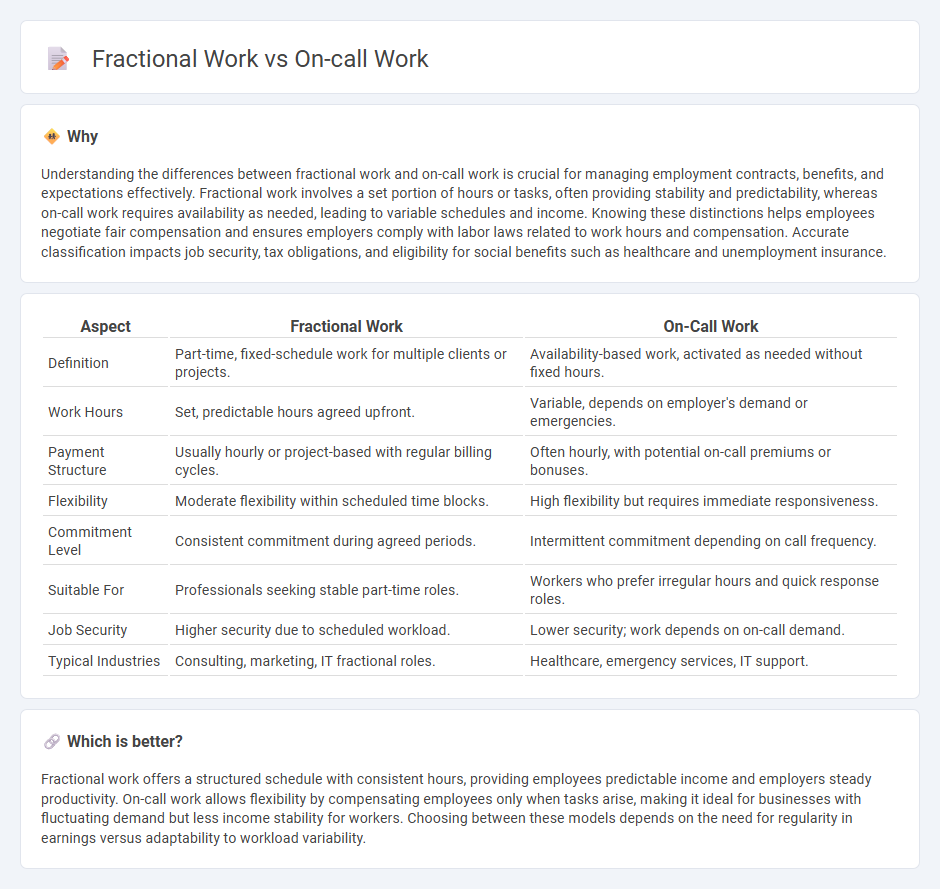
Fractional work offers professionals the opportunity to contribute a fixed number of hours or specific expertise across multiple employers, providing stability and predictability. On-call work requires employees to remain available for tasks or shifts as needed, emphasizing flexibility but often resulting in variable schedules and income. Explore the differences between fractional and on-call work to determine the best fit for your career needs.
Why it is important
Understanding the differences between fractional work and on-call work is crucial for managing employment contracts, benefits, and expectations effectively. Fractional work involves a set portion of hours or tasks, often providing stability and predictability, whereas on-call work requires availability as needed, leading to variable schedules and income. Knowing these distinctions helps employees negotiate fair compensation and ensures employers comply with labor laws related to work hours and compensation. Accurate classification impacts job security, tax obligations, and eligibility for social benefits such as healthcare and unemployment insurance.
Comparison Table
| Aspect | Fractional Work | On-Call Work |
|---|---|---|
| Definition | Part-time, fixed-schedule work for multiple clients or projects. | Availability-based work, activated as needed without fixed hours. |
| Work Hours | Set, predictable hours agreed upfront. | Variable, depends on employer's demand or emergencies. |
| Payment Structure | Usually hourly or project-based with regular billing cycles. | Often hourly, with potential on-call premiums or bonuses. |
| Flexibility | Moderate flexibility within scheduled time blocks. | High flexibility but requires immediate responsiveness. |
| Commitment Level | Consistent commitment during agreed periods. | Intermittent commitment depending on call frequency. |
| Suitable For | Professionals seeking stable part-time roles. | Workers who prefer irregular hours and quick response roles. |
| Job Security | Higher security due to scheduled workload. | Lower security; work depends on on-call demand. |
| Typical Industries | Consulting, marketing, IT fractional roles. | Healthcare, emergency services, IT support. |
Which is better?
Fractional work offers a structured schedule with consistent hours, providing employees predictable income and employers steady productivity. On-call work allows flexibility by compensating employees only when tasks arise, making it ideal for businesses with fluctuating demand but less income stability for workers. Choosing between these models depends on the need for regularity in earnings versus adaptability to workload variability.
Connection
Fractional work and on-call work both offer flexible employment arrangements that meet fluctuating business demands and worker availability. Fractional work divides full-time duties into part-time roles, while on-call work requires employees to be available as needed, often with variable hours. These models optimize workforce efficiency, reduce labor costs, and provide adaptability in industries like healthcare, IT, and gig economy platforms.
Key Terms
Availability
On-call work demands constant readiness to respond immediately to tasks or emergencies, ensuring availability during specific hours or unpredictable intervals. Fractional work offers scheduled, part-time dedication with predictable availability, often aligned with project or role-specific commitments. Explore the differences in availability dynamics between on-call and fractional work to optimize workforce management.
Commitment
On-call work requires employees to remain available outside regular hours, demanding flexible commitment without guaranteed active duty time, often leading to unpredictable work-life balance. Fractional work involves a fixed, part-time commitment to specific projects or roles, providing greater control over work schedules and responsibilities. Discover how these distinct commitment models impact productivity and employee satisfaction by exploring their unique advantages.
Compensation
On-call work typically offers hourly or shift-based pay with additional premiums for availability outside regular hours, while fractional work provides a fixed salary proportional to the fraction of time dedicated, often with performance incentives tied to project outcomes. Compensation in on-call roles may fluctuate based on call frequency, whereas fractional roles ensure predictable earnings aligned with predefined responsibilities. Explore the detailed comparison of compensation structures in on-call and fractional work to optimize your career strategy.
Source and External Links
What Is On-call Employment? | Papaya Global - On-call work requires employees to be available outside regular hours on short notice, common in healthcare and public safety, with compensation varying by employer and law, sometimes including separate hourly rates, premium pay, standby pay, or call-back pay.
On-Call Duty Definition: Employee Rights and Legal Responsibilities - On-call duty means being reachable and ready to work quickly from chosen locations, often outside regular hours, with legal considerations involving minimum wage, overtime, and notice requirements depending on the jurisdiction.
What is On-Call Employment? Employee Rights & Rules - Playroll - On-call employment offers flexibility and extra income but entails unpredictability and possible work-life balance challenges, commonly used in industries needing variable staffing like healthcare and retail, with workers paid for availability and actual hours worked.
 dowidth.com
dowidth.com